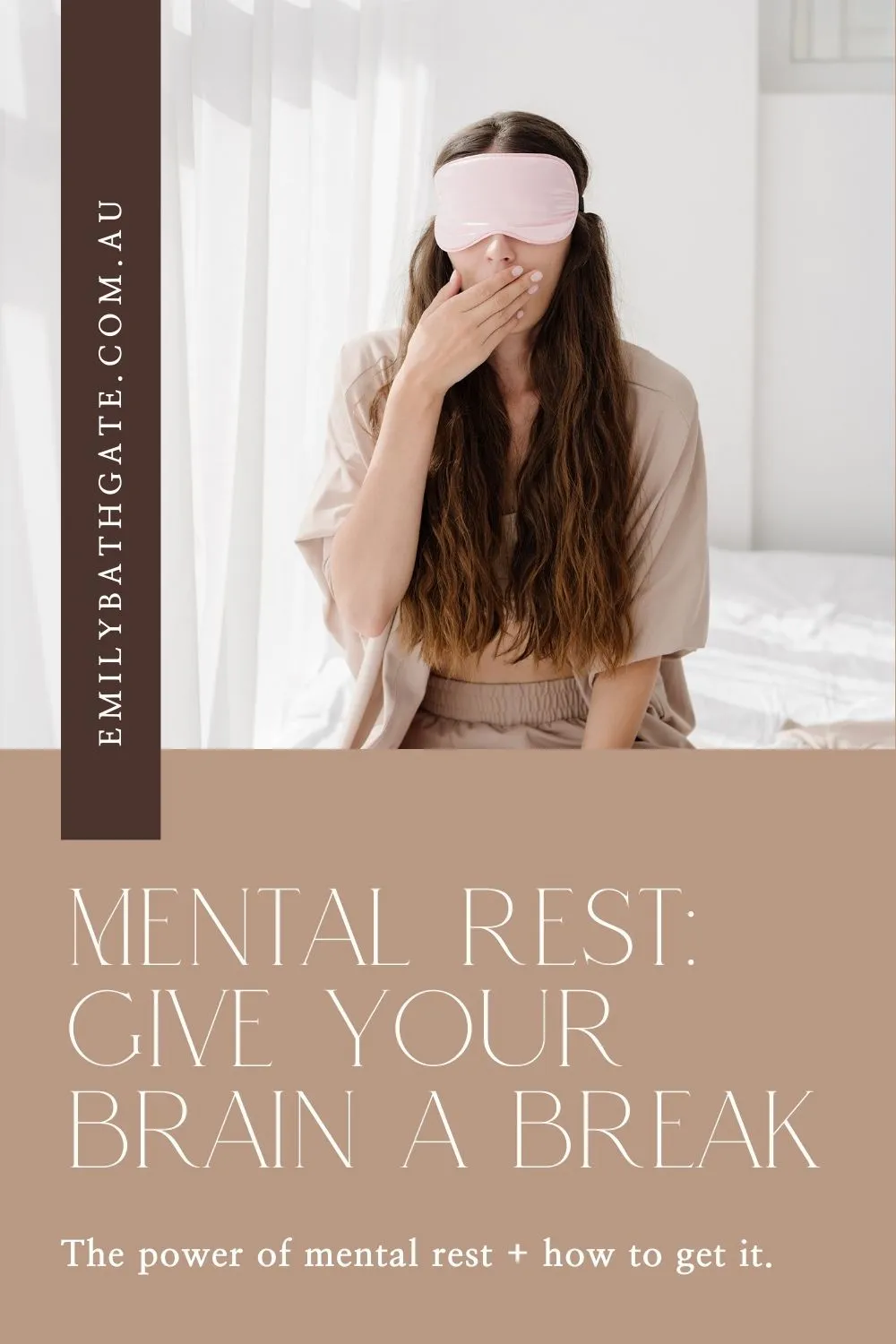Let’s talk Mental Rest: why your brain needs a break (and how to actually give it one).
Let’s be honest—most of us are chronically overstimulated. Between work, social media, life admin + that ever-growing to-do list, our brains are constantly “on.” Even when we think we’re resting (ahem, late-night doom scrolling!), our minds are so often still in overdrive.
If you’ve been feeling mentally drained, struggling to focus, or like you’re running on autopilot, you might not just need more sleep—you might need more rest of the mental variety.
Mental rest isn’t just about relaxing; it’s a crucial part of prioritising your mental health, supporting your nervous system + improving your overall wellbeing.
So, let’s dive into why mental rest is so important, what happens when you don’t get enough of it, and how to actually give your brain the break it needs.
What Is Mental Rest?
Mental rest is the practice of intentionally giving your brain a break from cognitive overload, information processing + constant stimulation. It’s not the same as sleep (although sleep is important, too!). Instead, mental rest helps to:
- Reduce stress + prevent burnout
- Improve focus, memory + creativity
- Support emotional resilience + mental health
- Lower nervous system overactivity (aka that frazzled, wired-but-tired feeling)
- Enhance overall mind-body wellbeing
Think of your brain like your phone – when you’re constantly running apps in the background, it drains your battery fast. Mental rest is like hitting the “reset” button, allowing you to recharge, process your emotions + restore your cognitive function.
The Problem: Why We Struggle to Rest Mentally
In today’s world, it’s like mental exhaustion is almost expected. We glorify busyness + treat rest like a luxury instead of the necessity it darn well is. Sound familiar?
Some of the biggest culprits draining your mental energy include:
- Constant stimulation (social media, emails, notifications, news cycles)
- Mental multitasking (juggling work, relationships + those 1,000 life admin tasks)
- Information overload (reading, listening, watching everything at once)
- Emotional exhaustion (holding space for others while ignoring your own needs)
- Lack of boundaries (always being available + never saying no)
And here’s the thing: your brain wasn’t designed to function at full speed 24/7.
Without proper mental rest – without resting that noggin of yours as often as needed – you’re more likely to experience:
- Brain fog + forgetfulness
- Anxiety + irritability
- Chronic fatigue + poor sleep (ironic, but IYKYK)
- Difficulty concentrating + making decisions
- Increased stress + emotional overwhelm
The good news? You can train your brain to rest—and it’s easier to do so than you might think.

How to Give Your Brain the Rest It Needs
Ready to reclaim your mental energy? Here are some practical ways to incorporate mental rest into your daily life.
1. Schedule some “Brain-Off” time
Give yourself some dedicated tech-free, work-free + obligation-free time – every day.
- Set screen-free zones (e.g., no phone during meals or before bed).
- Schedule mini-breaks throughout the day (even 5 minutes of stillness helps!).
- Take one full day a week to unplug + slow down (hello, mindful Sundays!).
2. Embrace Boredom
Instead of reaching for your phone the second you have any semblance of downtime (you know: in the waiting room at an appointment, in the ad break during MAFS, etc. etc.), let yourself be bored.
- Take a peek outside the window
- Scan your body – notice any tense spots + let go as you breathe into them
- Let your mind wander + allow yourself to daydream
- Sit with your thoughts – without distraction
Boredom’s probably going to feel uncomfortable at first (we’re so used to being entertained 24/7!), but it’s essential for creativity, problem-solving + mental restoration.
3. Practice Mindful Rest
Rest doesn’t always mean doing nothing – it means being present.
- Try meditation or breathwork (even 3 deep breaths can make a difference to your brain + your nervous system).
- Engage in sensory relaxation (soft music, aromatherapy, or simply feeling the sunshine on your skin).
- Do a mindful activity (painting, colouring, knitting, gardening, slow stretching) where you focus on the process + not on an outcome.
4. Protect Your Mental Energy
Reduce unnecessary cognitive load by simplifying your day.
- Declutter your space (visual clutter = mental clutter).
- Set clear boundaries (say no to more of the things that drain you).
- Create routines (simple ones) to save you from having to make a million micro-decisions all day, every day.
5. Sleep Smarter, Not Just Longer
True mental restoration happens in deep sleep—but stress + overstimulation often sabotage it.
- Avoid screens for at least an hour before bed.
- Create a wind-down routine (journaling, herbal tea, or some gentle stretching).
- If your mind races at night, try a “brain dump” journal to offload thoughts before you even attempt to get to sleep.
Prioritising Mental Rest for Better Health
Mental rest isn’t a luxury—it’s a necessity for your brain, body + emotional wellbeing. When you prioritise intentional rest, you allow yourself the opportunity to:
- Think more clearly
- Feel more emotionally balanced
- Feel more connected to your physical body
- Reduce stress + overwhelm
- Strengthen your nervous system
The best part? Mental rest doesn’t require big life changes—just small, intentional moments of stillness, presence + boundary-setting.
If you’re over your nervous system feeling frazzled + overstimulated, I’m here to help. As a naturopath, I work with women to restore balance, reduce stress + support mental health naturally. Book a free discovery call, and let’s create a plan that works for you!

The TL;DR Edit
What you need to know…
Your brain wasn’t designed to be switched on 24/7. Constant stimulation, stress + information overload can lead to burnout, brain fog + emotional exhaustion.
Mental rest is essential for recharging your mind, improving focus, reducing stress + supporting overall wellbeing.
To get more mental rest, try tech-free time, deep breathing, mindful activities + simplifying your daily routine. Prioritising mental rest strengthens your nervous system, boosts resilience, + improves your overall health.
Need help managing stress, anxiety or burnout naturally? Book a free discovery call, and let’s create a plan to support your mind + body!



